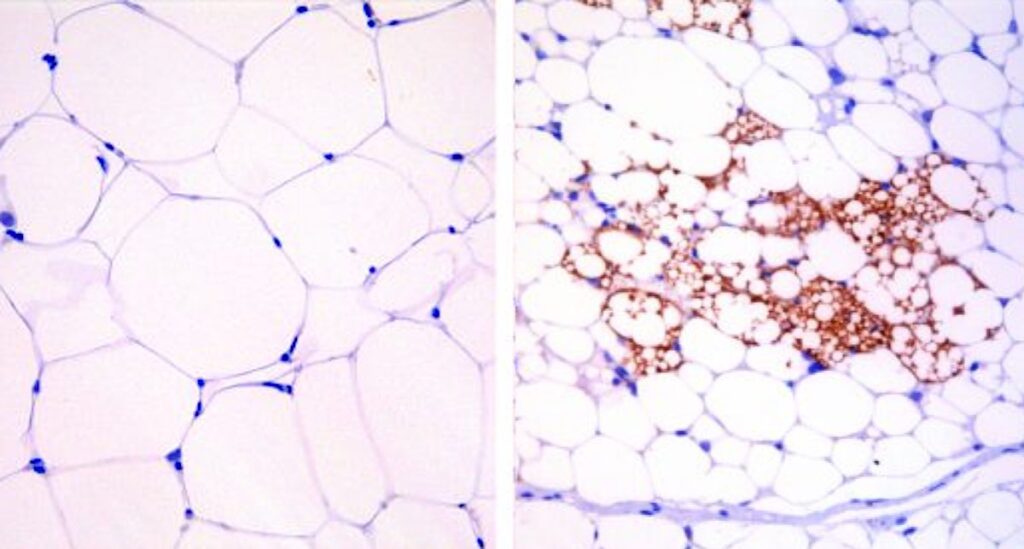
[ad_1]
Obesity has long been known to be an inflammatory disease, that is, a chronic defensive reaction of the body to stress caused by excess nutrients.
Based on this knowledge, a group of researchers led by Nabil Djouder, Head of the Growth Factors, Nutrients and Cancer Group at the National Cancer Research Center (CNIO), decided to try to fight obesity by preventing inflammation, and they succeeded.
Their article, published this month in Nature Metabolism, shows that digoxin, a drug already used against heart disease, reduces inflammation and leads to a 40% weight loss in obese mice, with no side effects.
Digoxin reverses obesity completely, according to the CNIO. The treated mice reached the same weight as the healthy non-obese animals. The mice were also cured of metabolic disorders associated with obesity.
Digoxin reduces the production of a molecule called interleukin 17A (IL-17A) that generally triggers inflammation. The study identifies it as a causal factor for obesity: “When you inhibit the production of IL-17A or the signaling pathway that activates this molecule, you are not obese,” says Djouder.
The Madrid researchers found that IL-17A acts directly on adipose tissue causing obesity and severe metabolic alterations associated with increased body weight, the so-called metabolic syndrome, which includes type 2 diabetes, hypertension and cardiovascular diseases.
“Since no effective treatments are available for obesity and metabolic syndrome, digoxin may represent an effective therapeutic option,” they wrote in the article in Nature Metabolism.
Same food, but metabolism sped up
The animals, obese due to a high calorie diet, continued to eat as before when taking digoxin. However, they showed activation of their basal metabolism, resulting in excess fat burning and weight loss.

Djouder’s group at the CNIO already observed weight loss within a few weeks, with no adverse effects. The benefits were sustained for at least eight months, suggesting that no resistance mechanisms develop.
Therefore, these findings are clinically relevant: “It is tempting to propose that obese patients can take digoxin for a short period until weight loss stabilizes and then follow a healthy diet,” says Ana Teijeiro, first author of the article. “The drug could also be indicated for obesity-related pathologies, such as hypercholesterolemia, hepatic steatosis and type 2 diabetes,” adds Teijeiro.
RELATED: Caffeine May Outweigh Health Risks of High-Sugar Diets, New Study Says
But the researchers also emphasize that the results were obtained in mice and that epidemiological studies and clinical trials are required to corroborate them in humans.
The ‘first causal link between obesity and inflammation’
In addition to this potential clinical relevance, the finding is of basic value because it “identifies a causal link between inflammation and weight gain,” say the authors. It opens up crucial new avenues of research to elucidate the molecular mechanisms that make obesity an inflammatory disease.
“Thanks to this study, we know that weight loss and systemic metabolic changes are controlled by a unique molecular mechanism, IL-17A, which acts directly on adipocytes and changes their genetic profile and their ability to respond to excess nutrients” says Djouder.
RELATED: Slim and healthy: the benefits of the new ‘green’ Mediterranean diet revealed in a study
“We still do not know how nutrients trigger the inflammatory reaction or which cells produce interleukin 17A, and that is what we are going to study next,” reveals Djouder. “Understanding the connection between excess nutrients, inflammation, and obesity is essential to finding novel approaches to treating weight gain,” he adds.
Defined by the authors of the article as “excessive accumulation of fat generally caused by chronic overeating and / or inadequate physical activity”, obesity today does not have an effective treatment.
“Current options are limited and have not improved in the last 20 years, mainly due to insufficient knowledge about the pathophysiology of obesity and the mechanisms that govern fat accumulation,” the team wrote.
Therapies based on lifestyle changes (changes in diet and physical activity) achieve a weight reduction of approximately 10%, and medications that target appetite or fat absorption generally result in loss of body weight between 2% and 7%.
This study provides a possible therapeutic strategy based on a novel approach: combat obesity by targeting its inflammatory component.
CHECK: An 86-year-old woman has lost 120 pounds just by walking around her one-bedroom apartment
The team began this line of research five years ago, when, in another study on inflammation and liver cancer, they observed that the mice were losing weight, so they postulated that blocking the production of IL-17A with digoxin would reduce the action of IL – 17A and thus reduce the weight of the mice. “That was actually what we saw right away,” says Djouder.
A drug already available
Digoxin has long been used to treat heart failure and is known to act on IL-17A. However, its effect on body weight had never been observed. Djouder attributes this to the fact that the cardiovascular disease of patients using digoxin causes high fluid retention, which masks the weight loss effect of digoxin.
In addition, the dose at which digoxin is currently used in humans is three times lower than that used in mice to combat obesity, without toxic effects. The fact that no side effects have been observed in animals suggests that, in humans, the dose at which weight loss could be observed may not be harmful.
This study has been funded by the Spanish Ministry of Science and Innovation, the State Research Agency, co-financed by the European Regional Development Fund, the Carlos III Health Institute, the European Foundation for the Study of Diabetes and the Pfizer Foundation .
Fountain: CNIO
SHARE this juicy news with your friends on Facebook …
[ad_2]
Original source





